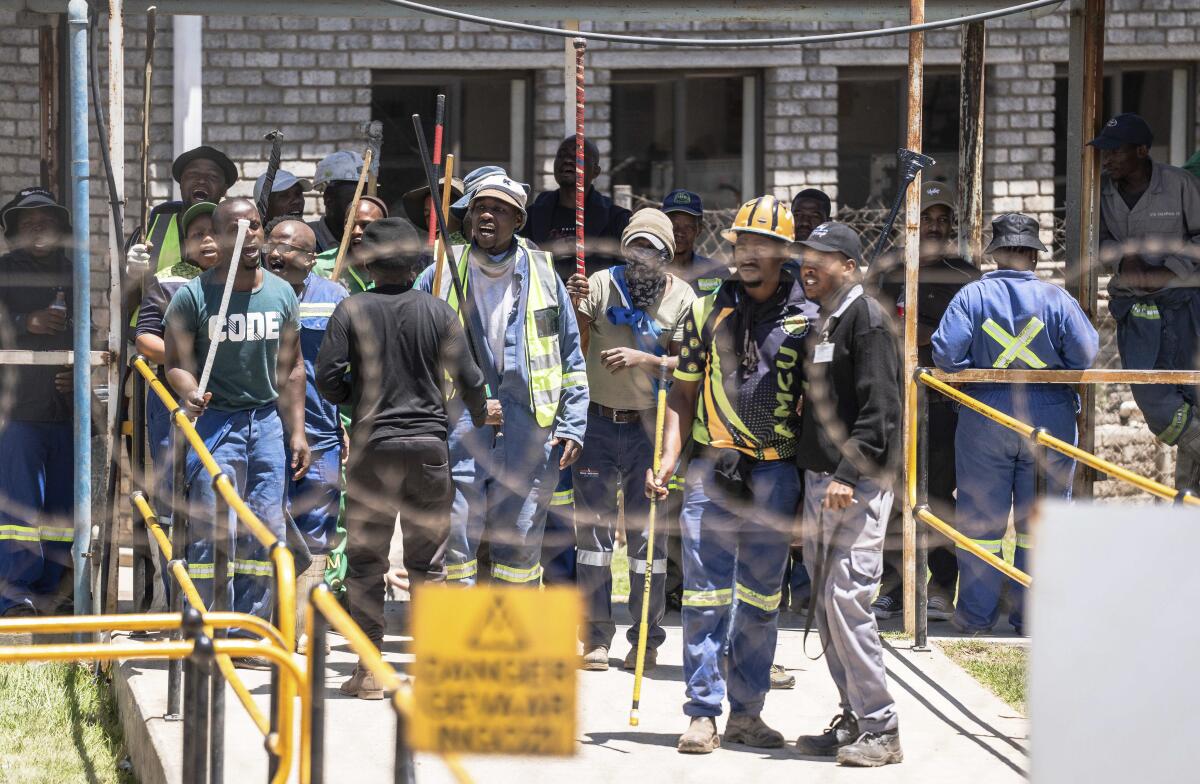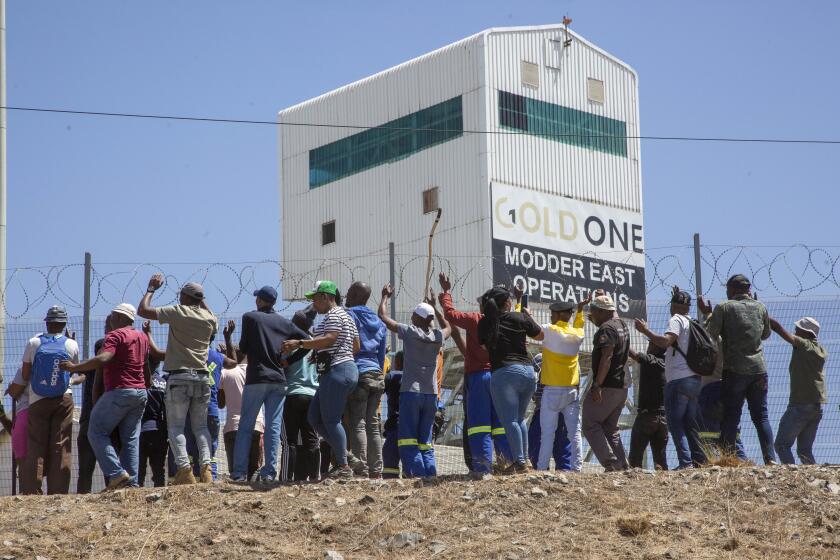Miners leave South Africa gold mine after 3 days underground in union dispute

- Share via
SPRINGS, South Africa — Hundreds of miners who spent three days underground as part of a union dispute were leaving a gold mine in South Africa on Wednesday, the union at the center of the standoff said.
More than 100 miners who were held against their will by fellow employees of the mine near Johannesburg escaped earlier, a mine official said.
More than 550 mine workers had been in the mine since they went down late Sunday. An unknown number of them prevented the others from leaving as they demanded formal recognition of their unregistered labor union, the mine official said.
The company that runs the mine said it had rough estimates indicating that around 110-120 of the miners were likely supporters of the unregistered union and had kept their co-workers from departing, although it was not certain.
The union — the Assn. of Mineworkers and Construction Union — gave another version of the events and said the miners had stayed underground willingly as a protest in support of the union. The AMCU union denied anyone was held against their will despite police and mine officials calling it a “hostage” situation.
Police in South Africa say a group of gold miners from an unregistered, rival union are holding hundreds of colleagues underground for a second day.
Miners carrying sticks and poles were seen emerging from the Modder East mine in Springs, east of Johannesburg. Some of them said that all workers underground were coming out.
The trouble at Modder East began early Monday after 562 miners and other workers remained underground at the end of their night shift.
Mine officials say approximately 15 were injured in scuffles, including a man that authorities think sustained a serious head injury. When mine officials sent a paramedic and a security officer to evacuate the man from the mine on Monday, they were also taken hostage, according to the head of the mine.
There was no immediate update from authorities on those injured mine workers. There were no signs of violence as the miners left the mine.
Early Wednesday, 109 miners had forced their way out, said Ziyaad Hassam, the head of legal at Gold One International, the company that owns the mine.
South Africa police open fire on striking miners
“This morning, they banded together and overpowered those controlling them and blocking the exits,” Hassam said. “They are tired, exhausted and dehydrated.”
They had given statements to police and been examined at a clinic, but none appeared to have any serious injuries, Hassam said.
The AMCU union says it represents the majority of miners at Modder East and that they want the union to be recognized. The mine currently has a closed-shop agreement for its miners to be represented by another union, the National Union of Mineworkers, or NUM.
“Look, the dispute is simple, and we have been saying this for the past few days,” AMCU regional secretary Tladi Mokwena said. “Workers are saying they do not wish, or no longer want to belong to NUM. They want to be represented by AMCU as the trade union of their choice.”
“[Mine] management and NUM are refusing by all means to grant AMCU access into the operation in terms of recognition,” he said.
This article was originally on a blog post platform and may be missing photos, graphics or links.
Mokwena said AMCU officials had not been in contact with the mine workers underground and were not allowed near the mine during the standoff, but Hassam said underground telephones were used to call an AMCU leader.
Police sent to the mine had taken a cautious approach over the three days and did not launch an operation to go underground and confront miners who might be holding others.
The rivalry between the AMCU and NUM unions is well known in South African mining circles and was partly behind one of the country’s most horrific mining episodes, when 34 striking miners were shot dead by police at a platinum mine in North West province in 2012. Six other mine workers, two police officers and two private security guards were killed as violence spiraled out of control at the Marikana mine in the days leading up to the mass police shooting, which is now known as the Marikana massacre.
It was the most lethal use of force by South African police since the 1976 Soweto uprisings against the apartheid regime.
Imray reported from Cape Town, South Africa.
More to Read
Sign up for Essential California
The most important California stories and recommendations in your inbox every morning.
You may occasionally receive promotional content from the Los Angeles Times.













